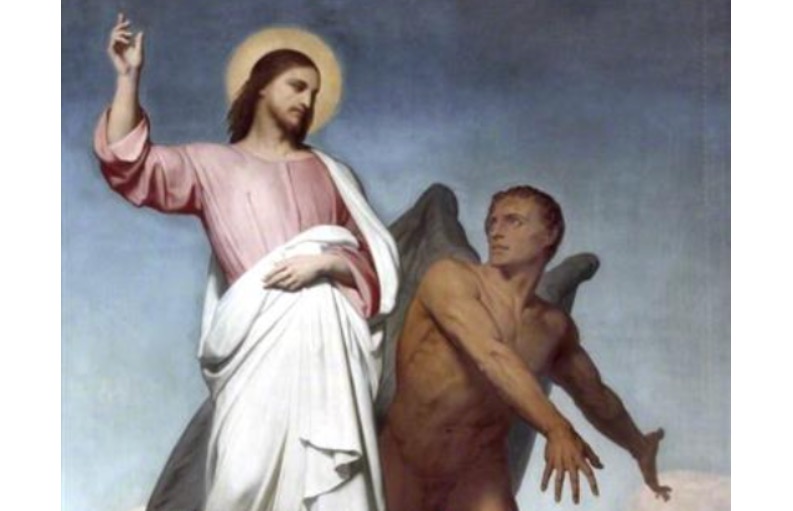He Was Hungry
March 2, 2023
Then Jesus was led up by the Spirit into the wilderness to be tempted by the devil. And after fasting forty days and forty nights, he was hungry. (Matthew 4:1-2 ESV) Jesus’ temptation in the wilderness serves as a clear reminder of what it meant for Him to take upon himself our very flesh. Today at International Lutheran Church we reflect on the meaning of the Second Article of the Apostles’ Creed: that He has purchased and won us with His own “precious blood.” By doing so we again confess that God saves us in our flesh so that we can live in Him both now and in the life to come.
Lent is the ancient Christian custom of penitential preparation. For forty days we reflect on the cross and our Savior’s suffering as we prepare physically, emotionally, and spiritually to celebrate the resurrection of our Savior Jesus Christ on Easter morning. How can we begin to fathom the forgiveness of our sin won for us through His victory unless we “walk” with Him and see what He endured? In fact, Jesus’ forty-day temptation in the wilderness offers us a glimpse into the close connection between His baptism and His suffering, and the temptation that He endured not just for forty days, but for His entire ministry culminating on the cross. Like Israel, Jesus is declared the Son of God in and through the water (Exodus 13:14-15; Matthew 2:15; 3:17) and then He enters the wilderness for a time of testing. But unlike Israel, Jesus does not succumb to the temptations that so easily ensnare us. He is the One who conquers the devil through His reliance on the Word of God so that He can serve as that perfect substitute. Today, we reflect on His temptation, and especially what it means to confess Jesus Christ as our Lord from Luther’s explanation of the Second Article of the Apostles’ Creed.
And (I believe) in Jesus Christ, His only Son, our Lord, who was conceived by the Holy Spirit, born of the Virgin Mary, suffered under Pontius Pilate, was crucified, died and was buried. He descended into hell. The third day He rose again from the dead. He ascended into heaven and sits at the right hand of God, the Father Almighty. From thence He will come to judge the living and the dead.
What does this mean? I believe that Jesus Christ, true God, begotten of the Father from eternity, and also true man, born of the Virgin Mary, is my Lord, who has redeemed me, a lost and condemned person, purchased and won me from all sins, from death, and from the power of the devil; not with gold or silver, but with His holy, precious blood and with His innocent suffering and death, that I may be His own and live under Him in His kingdom and serve Him in everlasting righteousness, innocence, and blessedness, just as He is risen from the dead, lives and reigns to all eternity. This is most certainly true. (Luther’s Small Catechism; Apostles’ Creed)
Luther pulls together these two truths that Jesus is both “true God” and “true man” in what it is to confess that Jesus Christ is Lord. He is not half and half but all in all. Both of these truths are evident in His temptation. His Spirit-led journey was a confirmation of His complete Sonship, even as His hunger was completely the same in kind as you and I feel each day when we have missed a meal or two. Only the Son of God can do what He does, and only the Son of Man can suffer in every way that you and I suffer. Why is that important? Because our sin is not just an external malady or a figment of our imagination. Our sin is in our very flesh and bone completely infecting and touching every part of God’s creation. His innocent suffering is real. His precious blood and unwavering obedience is what alone can undo the curse.
This is why Luther’s understanding of “Lord” is rooted in the Biblical concept of redemption. In and through Jesus’ physical suffering and death, you and I were won, purchased, and now we belong not to self but to Him who died and rose for us, who gave His Body and Blood for us, who rose from the dead for us. In an age when our whole world hungers for identity and a sense of purpose, God satisfies that hunger with His very Son. Jesus hungers for us. His sole desire, His Spirit-led trip had one aim – that you and I would be His.
In Him through baptism we now live a very different existence. Our purpose, our hunger, is no longer satisfied with self, but only in our service to our neighbor. In our care for our neighbor through the vocations and callings that God has ordained we now are free to live for His glory! His reign and rule are not a burden but a delight that gives to us something that all our hunger could never satisfy: sheer joy! Even our own momentary suffering, our holy fast and Lenten “hunger” is not a burden but rather part of His Spirit-led effort to bring all to the knowledge of what He has done for us all.
Pastor Carl
